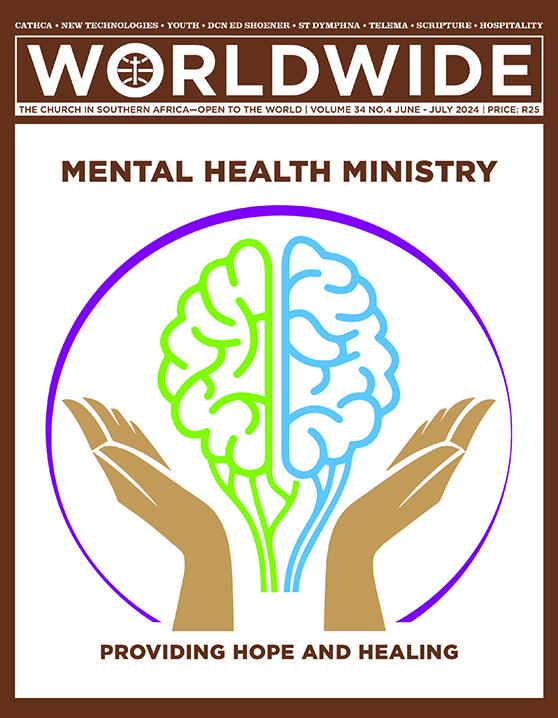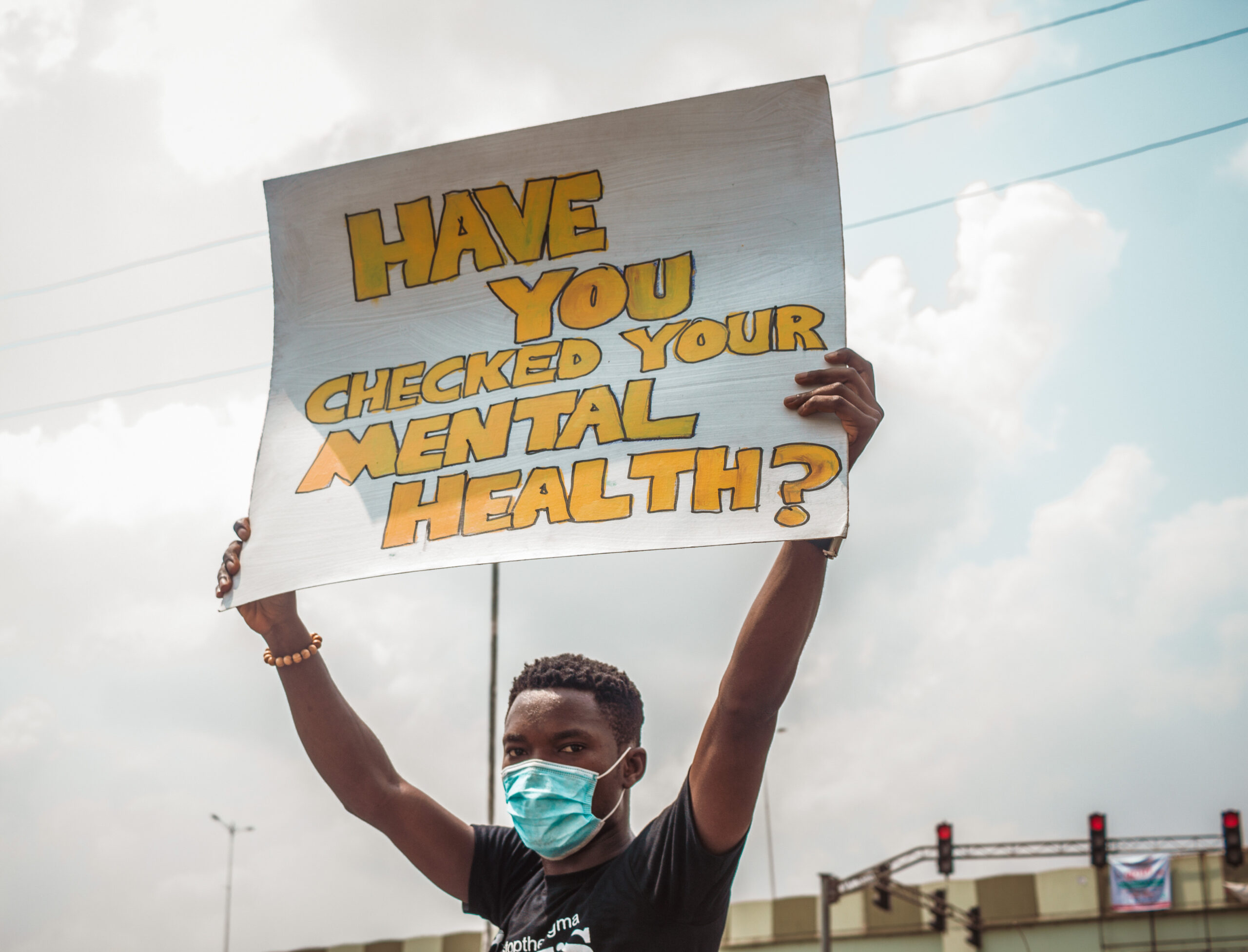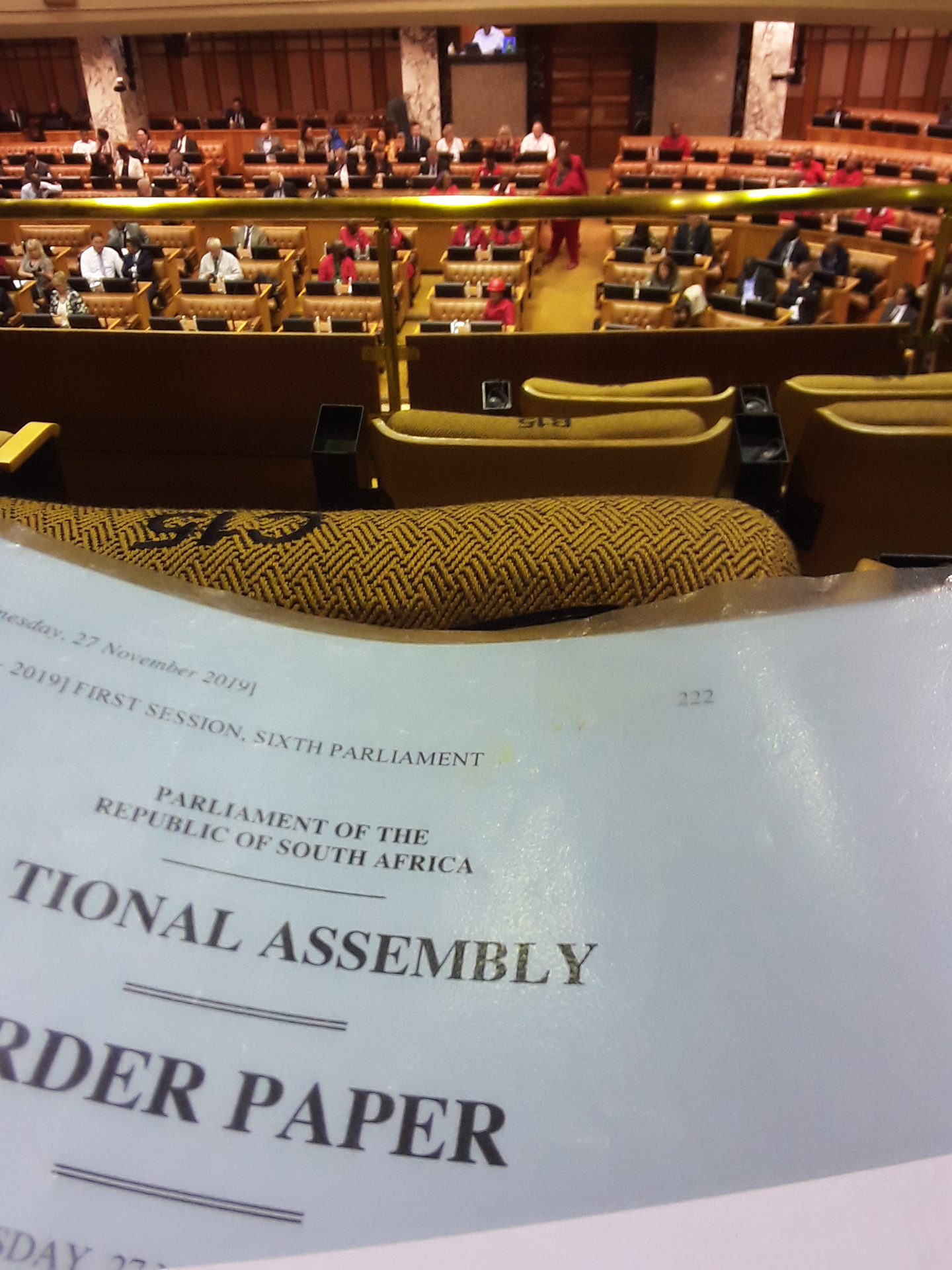
MENTAL HEALTH MINISTRY: PROVIDING HOPE AND HEALING
The colours symbolise peace and nature, the brain represents the mind and the hands imply care—thus giving the impression of ‘the mind in caring hands.’ (Lauren Bikhani, Mental Health Ministry Coordinator at All Saints Catholic Church, Ennerdale, Johannesburg).
Design by Warren Singh from DesignCreed.
INSIGHTS • MENTAL HEALTH

A FUNDAMENTAL HUMAN RIGHT
BY LOIS LAW | SOCIAL WORKER, PROJECT CO-ORDINATOR WOMEN, CHILDREN & THE FAMILY PROJECT, SACBC PARLIAMENTARY LIAISON OFFICE, CAPE TOWN
ATTENTION TO the subject of mental health is increasing as a public health priority and human rights imperative. According to the World Health Organization (WHO): “Mental health is an integral component of maintaining good overall health. When individuals are mentally healthy, they are able to realize their own abilities, cope with the normal stresses of life, work productively, and make positive contributions to their community.” Mental health can be seen as a continuum stretching from those who experience a positive sense of well-being, have good support systems and easy access to psycho-social and health care professionals and services, to those who are struggling with severe mental disorders. However, there are social determinants such as poverty, violence, and other external factors that can have a profound effect on levels of stress and mental well-being. Our society is overwhelmed by psychosocial, political, and economic upheaval, all of which are compromising the mental and emotional health of South Africans.
Silent crisis
Mental health is a silent crisis, with 67% of South Africans having no access to mental health care, and 9.7% of the population (which amounts to 6 million people) suffering from depression. This contributes to a R232 billion loss to the economy due to absenteeism, illness, and demotivation; 55% of the population suffer from anxiety and panic attacks, and 46% experience financial pressure and stress. There has been an increase in substance abuse, with many non-drinkers turning to alcohol for comfort. The South African Depression and Anxiety Group (SADAG) reports that there are 23 known cases of suicide in South Africa every day and, for every person who actually commits suicide, 10 have attempted it. The South African Federation for Mental Health (SAFMH) points out that mental illness is strongly linked to health and social inequalities, and these inequalities affect large groups of people, whether they are defined socially, economically, demographically, or geographically. Good mental health depends on a delicate balance of factors, and several elements may contribute to the development of mental health conditions. Stress and anxiety have emerged as the biggest concerns in modern times while depression is seen as the leading health disability.
There is also an increasing understanding of the impact of non-medical factors on mental health. These include socio-economic conditions, such as employment opportunities, the degree of social connections and psycho-social support, the level of education, and the quality of housing. Furthermore, researchers have found that being female increased the risk of low mental health status nearly fourfold. Those living in poverty also scored the highest for poor mental health status. A recent study conducted among students in Ghana found that participants’ perception of corruption had a negative impact on their mental health. This manifested in an increased risk of suicide as well as symptoms of anxiety and depression.
Right to Mental Health
The report by the Health Ombudsman into the Life Esidimeni tragedy emphasised that it is the constitutional obligation of the South African government—as well as society as a whole—to respect the rights of people with mental health disorders, and to make quality health services accessible to all South Africans, irrespective of their socio-economic status and regardless of where they live. In an open letter to President Ramaphosa, the SAFMH reminded him that as a member state of the United Nations and the WHO, South Africa has an obligation towards the agreements adopted or endorsed at that level, to ensure that its citizens’ human rights, health, and mental wellbeing are underpinned in all local policies and legislation.
The WHO stresses that world leaders have committed to recognise prevention and treatment of non-communicable diseases, which include mental, neurological and substance abuse disorders, as health priorities within global development: “Promotion and prevention interventions work by identifying the individual, social and structural determinants of mental health, and then intervening to reshape the determinants of mental health which often requires action beyond the health sector and so promotion and prevention programmes should involve the education, labour, justice, transport, environment, housing, and welfare sectors. Reduce risks, build resilience and establish supportive environments for mental health.”
In his 2023 State of the Nation Address (SONA), President Ramaphosa demonstrated a growing awareness of the importance of mental well-being, saying that “our starting point must be to raise awareness and combat stigma around mental health, so that people are able to seek and receive mental health services”. The SAFMH welcomed this statement and stressed that “these mental health services and interventions must be delivered at all levels of healthcare by well-trained, well-equipped, culturally- and gender-sensitive health workers, who are paid fairly and can recognise the comorbidities between physical and mental health”. This is important for the realisation of the constitutional entitlements of respect, equality, and dignity for all.

